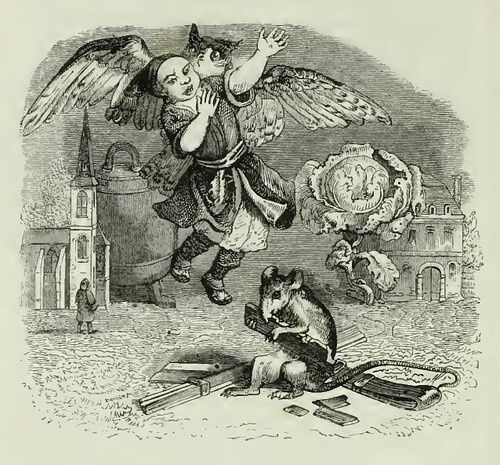Animals have graced my line:
Higher heroes in my story
Might have won me less of glory.
Wolves, in language of the sky,
Talk with dogs throughout my verse;
Beasts with others shrewdly vie,
Representing characters;
Fools in furs not second-hand,
Sages, hoof'd or feather'd, stand:
Fewer truly are the latter,
More the former--ay, and fatter.
Flourish also in my scene
Tyrants, villains, mountebanks,
Beasts incapable of thanks,
Beasts of rash and reckless pranks,
Beasts of sly and flattering mien;
Troops of liars, too, I ween.
As to men, of every age,
All are liars, saith the sage.
Had he writ but of the low,
One could hardly think it so;
But that human mortals, all,
Lie like serpents, great and small,
Had another certified it,
I, for one, should have denied it.
He who lies in Aesop's way,
Or like Homer, minstrel gray,
Is no liar, sooth to say.
Charms that bind us like a dream,
Offspring of their happy art,
Cloak'd in fiction, more than seem
Truth to offer to the heart.
Both have left us works which I
Think unworthy e'er to die.
Liar call not him who squares
All his ends and aims with theirs;
But from sacred truth to vary,
Like the false depositary,
Is to be, by every rule
Both a liar and a fool.
The story goes:
A man of trade,
In Persia, with his neighbour made
Deposit, as he left the state,
Of iron, say a hundredweight.
Return'd, said he, 'My iron, neighbour.'
'Your iron! you have lost your labour;
I grieve to say it,--'pon my soul,
A rat has eaten up the whole.
My men were sharply scolded at,
But yet a hole, in spite of that,
Was left, as one is wont to be
In every barn or granary,
By which crept in that cursed rat.'
Admiring much the novel thief,
The man affected full belief.
Ere long, his faithless neighbour's child
He stole away,--a heavy lad,--
And then to supper bade the dad,
Who thus plead off in accents sad:--
'It was but yesterday I had
A boy as fine as ever smiled,
An only son, as dear as life,
The darling of myself and wife.
Alas! we have him now no more,
And every joy with us is o'er.'
Replied the merchant, 'Yesternight,
By evening's faint and dusky ray,
I saw a monstrous owl alight,
And bear your darling son away
To yonder tott'ring ruin gray.'
'Can I believe you, when you say
An owl bore off: so large a prey?
How could it be?' the father cried;
'The thing is surely quite absurd;
My son with ease had kill'd the bird.'
'The how of it,' the man replied,
'Is not my province to decide;
I know I saw your son arise,
Borne through, the air before my eyes.
Why should it seem a strange affair,
Moreover, in a country where
A single rat contrives to eat
A hundred pounds of iron meat,
That owls should be of strength to lift ye
A booby boy that weighs but fifty?'
The other plainly saw the trick,
Restored the iron very quick.
And got, with shame as well as joy,
Possession of his kidnapp'd boy.
The like occurr'd two travellers between.
One was of those
Who wear a microscope, I ween,
Each side the nose.
Would you believe their tales romantic,
Our Europe, in its monsters, beats
The lands that feel the tropic heats,
Surcharged with all that is gigantic.
This person, feeling free
To use the trope hyperbole,
Had seen a cabbage with his eyes
Exceeding any house in size.
'And I have seen,' the other cries,
Resolved to leave his fellow in the lurch,
'A pot that would have held a church.
Why, friend, don't give that doubting look,--
The pot was made your cabbages to cook.'
This pot-discov'rer was a wit;
The iron-monger, too, was wise.
To such absurd and ultra lies
Their answers were exactly fit.
'Twere doing honour overmuch,
To reason or dispute with such.
To overbid them is the shortest path,
And less provocative of wrath.
Source: Wright's translation of La Fontaine, Fable 9.1.
Click here for a SLIDESHOW of all the Grandville images.
M0855 (not in Perry)

No comments:
Post a Comment